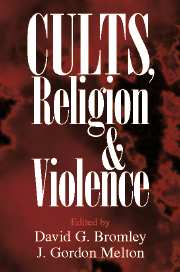Book contents
- Frontmatter
- Contents
- Acknowledgments
- Contributors
- Prologue
- 1 Violence and Religion in Perspective
- 2 Dramatic Denouements
- 3 Challenging Misconceptions about the New Religions–Violence Connection
- 4 Sources of Volatility in Religious Movements
- 5 Crises of Charismatic Legitimacy and Violent Behavior in New Religious Movements
- 6 Public Agency Involvement in Government–Religious Movement Confrontations
- 7 Watching for Violence: A Comparative Analysis of the Roles of Five Types of Cult-Watching Groups
- 8 Mass Suicide and the Branch Davidians
- 9 Occult Masters and the Temple of Doom: The Fiery End of the Solar Temple
- 10 Dramatic Confrontations: Aum Shinrikyô against the World
- 11 Making Sense of the Heaven's Gate Suicides
- 12 Lessons from the Past, Perspective for the Future
- Index
- References
8 - Mass Suicide and the Branch Davidians
Published online by Cambridge University Press: 09 July 2009
- Frontmatter
- Contents
- Acknowledgments
- Contributors
- Prologue
- 1 Violence and Religion in Perspective
- 2 Dramatic Denouements
- 3 Challenging Misconceptions about the New Religions–Violence Connection
- 4 Sources of Volatility in Religious Movements
- 5 Crises of Charismatic Legitimacy and Violent Behavior in New Religious Movements
- 6 Public Agency Involvement in Government–Religious Movement Confrontations
- 7 Watching for Violence: A Comparative Analysis of the Roles of Five Types of Cult-Watching Groups
- 8 Mass Suicide and the Branch Davidians
- 9 Occult Masters and the Temple of Doom: The Fiery End of the Solar Temple
- 10 Dramatic Confrontations: Aum Shinrikyô against the World
- 11 Making Sense of the Heaven's Gate Suicides
- 12 Lessons from the Past, Perspective for the Future
- Index
- References
Summary
Long before the U.S. Bureau of Alcohol, Tobacco, and Firearms (BATF) set out on their ill-fated raid against the Branch Davidians' Mount Carmel compound on February 28, 1993, long before the April 19, 1993, conflagration that engulfed the compound, causing the death of some seventy-four Branch Davidians and ending their standoff with the Federal Bureau of Investigation (FBI), David Koresh's apocalyptic sect was becoming “another Jonestown.” So said former Branch Davidians more than a year before the sect's shootout with BATF sharpshooters (Breault and King 1993: 11–12). I believe that the apostates were prophetic: Waco became a new Jonestown in the minds of the public. But was the former members' prophecy in part self-fulfilling? To probe this question, I examine here how cultural opponents of David Koresh reinvoked and reworked the central public meaning of Jonestown – mass suicide – in ways that shaped the conflict at Mount Carmel.
There is deep irony in the early prophetic warnings by former members against Mount Carmel as another Jonestown – a “cult.” The people who put the most effort into labeling countercultural religious groups as “cults” typically are not passive bystanders or critics after the fact. They are active opponents. In the case of Jonestown, the movement against the Peoples Temple contributed to the dynamic of accelerating conflict that ended in the murders and mass suicide (Hall 1987). If, as I believe, Mount Carmel must be understood as another Jonestown, then we must ask whether anticult labeling played into the conflict.
- Type
- Chapter
- Information
- Cults, Religion, and Violence , pp. 149 - 169Publisher: Cambridge University PressPrint publication year: 2002
References
- 6
- Cited by



